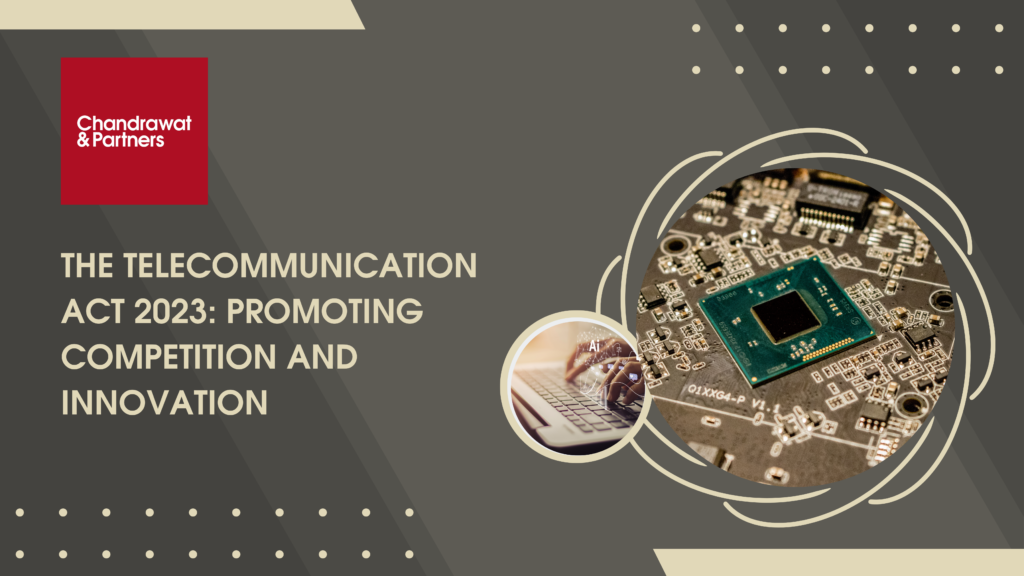Share :
Introduction
The Telecommunication Act 2023 has been approved by Parliament to update and organize the rules for telecommunications. The main goals are to encourage competition and innovation in the field. This new law will replace the old Indian Telegraph Act from 1885 and the Indian Wireless Telegraphy Act from 1933. One notable change is that it no longer includes Internet-based and Over-The-Top (“OTT”) communications in the telecom services definition. Instead, it broadens its scope to cover various forms of communication services.
A key feature of the Act is the creation of a new regulatory body called the Telecommunications Regulatory Authority of India (“TRAI”), which will take over from the existing Telecom Regulatory Authority of India (“TRAI”). TRAI’s job is to regulate the telecommunications sector, dealing with things like licensing, spectrum allocation, and interconnection.
Additionally, the Act introduces measures to promote competition and innovation, such as establishing a universal service fund, encouraging infrastructure sharing, and introducing a new licensing system for satellite-based services. These changes aim to make telecommunications more competitive, innovative, and accessible to people.
UNLOCKING TELECOM COMPETITIVENESS AND INNOVATION
The Telecommunication Act of 2023 aims to remove obstacles that restrict competition in the telecommunications industry, creating a favourable atmosphere for improved service quality and a wide range of options for customers. Simultaneously, the bill incorporates creative incentives using provisions that promote telecom research and development. This innovative strategy seeks to speed up technical development, placing the sector at the forefront of cutting-edge innovations and guaranteeing ongoing innovation.
ENSURING CONNECTIVITY EXCELLENCE AND CONSUMER SAFEGUARDS
The Telecommunications Act of 2023 emphasizes spectrum Optimization as a strategic objective, emphasizing effective spectrum management to improve frequency allocation. This approach is critical for adopting cutting-edge technologies such as 5G and IoT, encouraging innovation, and providing a seamless connected experience. At the same time, the legislation prioritizes consumer protection by creating high criteria for telecommunications service providers, ensuring that consumers obtain dependable and efficient services. The Act addresses privacy issues further by instituting safeguards to protect user data, establishing a complete framework that promotes both technical innovation and customer well-being.
GLOBAL INTERCONNECTION
Recognizing the interconnectedness of the globalized world, the Act emphasizes the need for international cooperation. It addresses cross-border difficulties and fosters global connectivity by aligning the country’s telecommunications standards with worldwide best practices.
HOW WE CAN HELP?
We offer comprehensive assistance in various areas of telecommunications law, ensuring our clients navigate legal complexities seamlessly. Our services include:
- Compliance with regulations: Advising clients on compliance with the Telecommunications Act 2023 regulations to ensure adherence to license requirements, spectrum allocation rules, and other regulatory measures.
- Application and Renewal of a License: Assisting clients with license application preparation and submission, as well as managing the renewal process to guarantee legal compliance.
- Contract drafting and review: Contract drafting, evaluation, and negotiation for telecommunications services, including agreements with service providers, contractors, and other stakeholders.
- Data Security and Privacy: Offering legal advice on data privacy and security problems, as well as assisting companies in complying with requirements and safeguarding customer data as defined in the Telecommunications Act 2023.
- Due Process: Conducting legal and regulatory risk evaluations for clients interested in mergers, acquisitions, or partnerships in the telecommunications sector.
For more information or queries, please email us at
enquiries@chandrawatpartners.com




